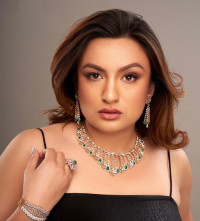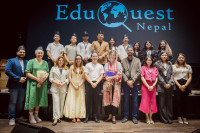Entertainment
Curating with Veerangana Kumari Solanki
Nepal has witnessed a lot of art activities in the past few years. Younger artists are more active than ever and people have actually started documenting and researching art.
The workshop was facilitated by Mumbai-based independent curator/writer Veerangana Kumari Solanki from February 20 to 24.
The participants in the workshop were Sujan Chitrakar (KUart), Sharareh Bajracharya (Srijanalaya), Manish Lal Shrestha (Gallery Mcube), Saroj Mahato (Bikalpa Art Centre), Nayantara Gurung Katshyapati (Photo Circle), Swosti Rajbhandari (Nepal Art Council), Priti Sherchan (Sattya Media Arts Collective), Erina Tamrakar (Kasthamandap Art Studio), Romel Bhattarai (Artlab), Ashmina Ranjit (Lasanaa Alternative Art Space), Kailash Shrestha (Artudio, Centre for Visual Art), Roshan Mishra (Taragaon Museum), Sunita Bhadel (Living Traditions Museum), Ashok Shaha (CBM Nepal), Avantika Gurung (Children’s Art Museum) and Aashika Sharma (Janapriya Multiple Campus).
“The workshop was insightful,” said Chitrakar during the fifth-day wrap-up of the programme. “Curatorial practices up until now [in Nepal] have been random and rather design-based. But in the five days we talked a lot about how curatorship also accounts for historic and theoretical underpinnings,” he added.
During the workshop, the participants were provided with reading materials written by theorists, art writers and curators. The group also discussed various issues concerning art and its management whilst making use of presentations and audio/visual materials. Discussions on the role of the artist’s attitude and the role of the curator and the critic were also discussed.
On the fourth day, the group went on a field visit to observe art works at the RN Joshi Museum, Pulchowk; Siddhartha Art Gallery, Babermahal; Nepal Art Council, Babermahal; Limbo Art Gallery, Tangal; The Simrik Atelier, Patan Dhoka; and to view Prithivi Bahadur Pande’s personal collection.
And on the fourth day, the group met at the Yala Maya Kendra, Patan Dhoka, to reflect on the previous day’s observations.
“We don’t have people with a proper curatorial background in Nepal,” said Mishra. “I think something like this [the workshop] can help us to polish our work,” he added.
Palistha Kashapati said that the workshop has made her realise the importance of expertise in a given subject. “Not everybody can do everything. That’s why you need expertise,” she said.




 9.33°C Kathmandu
9.33°C Kathmandu









